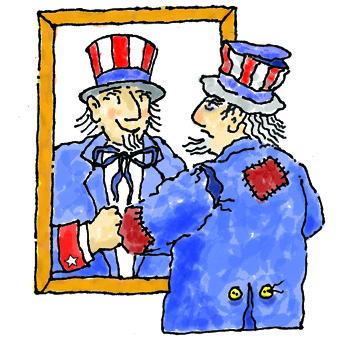America’s inflated self-image doesn’t reflect our nation’s obvious flaws.
When Harry Potter looks at the magical Mirror of Erised, he sees what he wants to see: his heart’s desire (get it?), a happy and whole Potter family. Harry finds himself transfixed by the beautiful reflection. And that’s the danger of the wondrous mirror, the ever-wise Albus Dumbledore informs Harry: the distinct possibility of never being able to tear oneself away from its satisfying perspective.
American politicians have long exalted the notion of American exceptionalism, transmogrifying as if by magic what had been an interesting historical brainteaser—why did socialism not take root in the United States?—into a cultural article of faith. In this understanding of exceptionalism, the United States stands as a lonely beacon of individual opportunity, domestic tranquility, and geo-political integrity. One need not master advanced divination to know that it ill betides any politician who does not exhibit sufficient, even extravagant, fealty to this peculiar notion.
Alas, there is something sadly juvenile in this dogged insistence on perfection, especially because by a calamitous collection of international measures of well-being, the United States lags far behind virtually all advanced economies—and sometimes falls below second- and even third-tier economic powers. And as any historian can tell you, scattered about the rice paddies of Asia, the cane fields and coffee plantations of Central and South America, the oil fields of Persia, and not least of all the wheat fields of the Great Plains and cotton fields of the South, there is plenty of evidence of our nation’s various historical moral lapses.
We are in truth not always the best, nor the most virtuous. Sometimes, like any great power, we have made mistakes and have done the wrong things.
Why does it matter? While we linger before the Mirror of Exceptionalism, dreamily transfixed, our economy and way of life have become increasingly threatened by poor socio-economic prioritizing and gravely misplaced, even immoral, geo-political policy. The United States is falling further behind the peers we’ve measured ourselves against.
Japan, often held up as an example of how America should not end up, still manages a life expectancy that is five years longer than ours. Its well-fed and welfared citizens have access to universal health care, live on the world’s technological cutting edge, and enjoy a broad affluence and security that middle-class Americans should envy, were they able to perceive it.
Likewise Europe has been rhetorically on display, particularly since its debt crisis began, as another anti-exemplar for life in the United States. Yet even after many of the proposed “austerity” packages are deployed to respond to this fiscal emergency, the people of Europe will enjoy social benefits that remain unimaginable in the United States.
Another cherished American belief, that class mobility in Europe is as rigid as a Norman tower, has been obliterated by a parade of studies demonstrating that social mobility is far more fluid in Western Europe and other English-speaking nations than in the United States. That knocks flat one of the primary rationalizations for the nation’s deeply unbalanced income tax policy.
Over-comforted by our embrace of national exceptionalism and overconfident in the “bestness” of all things American, the real and grave problems we need to confront become invisible to us. Instead of seriously appraising the embarrassing state of our national infrastructure, our crumbling cities and education systems, the mediocrity of our transportation and communications networks, and our diminishing standard of living, we warm ourselves before this reflection of perfection and assail anyone who dares to point out the blemishes and the cracks.
But when we evaluate ourselves in a true, clear mirror, we do not have to see Europe or Japan or some other nation gazing back at us. We can even spend a few moment “seeing” our heart’s desire, the America that we want to be. But first we have to be able to look upon the America that is.
This article appeared in the March 2012 issue of U.S. Catholic (Vol. 77, No. 3, page 39).
Image: Tom Wright















Add comment